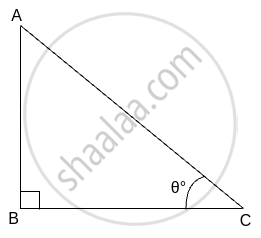Advertisements
Advertisements
प्रश्न
Prove the following trigonometric identities.
`1/(sec A + tan A) - 1/cos A = 1/cos A - 1/(sec A - tan A)`
उत्तर
In the given question, we need to prove `1/(sec A + tan A) - 1/cos A = 1/cos A - 1/(sec A - tan A)`
Here, we will first solve the L.H.S.
Now using `sec theta = 1/cos theta` and `tan theta = sin theta/cos theta`, we get
`1/(sec A + tan A) - 1/cos A = 1/(1/cos A + sin A/cos A) - (1/cos A)`
`= 1/(((1 + sin A)/cos A)) - (1/cos A)`
`= (cos A/(1 + sin A)) - (1/cos A)`
`= (cos^2 A - (1 + sin A))/((1 + sin A)(cos A))`
On further solving, we get
`(cos^2 A -(1 + sin A))/((1 + sin A)(cos A)) = (cos^2 A - 1 - sin A)/((1 + sin A)(cos A))`
`= (-sin^2 A - sin A)/((1 + sin A)(cos A))` (Using `sin^2 theta = 1 - cos^2 theta)`
`= (-sin A(sin A + 1))/((1 + sin A)(cos A))`
`= (-sin A)/cos A`
= -tan A
Similarly we solve the R.H.S.
`((1 - sin A) - cos^2 A)/((cos A)(1 - sin^2 A)) = (1 - sin A - cos^2 A)/((cos A)(1 - sin A))`
`= (sin^2 A - sin A)/((cos A)(1 - sin A))` (Using `sin^2 theta = 1- cos^2 theta`)
`= (-sin A(1 - sin A))/((cos A)(1 - sin A))`
`= (-sin A)/cos A`
= - tan A
So, L.H.S = R.H.S
Hence proved.
संबंधित प्रश्न
If `x/a=y/b = z/c` show that `x^3/a^3 + y^3/b^3 + z^3/c^3 = (3xyz)/(abc)`.
Prove the following trigonometric identities.
`sqrt((1 - cos A)/(1 + cos A)) = cosec A - cot A`
Prove the following trigonometric identities.
if cos A + cos2 A = 1, prove that sin2 A + sin4 A = 1
Prove the following identities:
sec2 A . cosec2 A = tan2 A + cot2 A + 2
Prove the following identities:
`(1 + cosA)/(1 - cosA) = tan^2A/(secA - 1)^2`
Prove that:
`tanA/(1 - cotA) + cotA/(1 - tanA) = secA cosecA + 1`
Prove that:
`(sinA - sinB)/(cosA + cosB) + (cosA - cosB)/(sinA + sinB) = 0`
Prove that:
(1 + tan A . tan B)2 + (tan A – tan B)2 = sec2 A sec2 B
If sec A + tan A = p, show that:
`sin A = (p^2 - 1)/(p^2 + 1)`
`(sec^2 theta-1) cot ^2 theta=1`
`(tan^2theta)/((1+ tan^2 theta))+ cot^2 theta/((1+ cot^2 theta))=1`
`(1+tan^2theta)(1+cot^2 theta)=1/((sin^2 theta- sin^4theta))`
` (sin theta - cos theta) / ( sin theta + cos theta ) + ( sin theta + cos theta ) / ( sin theta - cos theta ) = 2/ ((2 sin^2 theta -1))`
`(1+ cos theta - sin^2 theta )/(sin theta (1+ cos theta))= cot theta`
Show that none of the following is an identity:
(i) `cos^2theta + cos theta =1`
Show that none of the following is an identity:
`sin^2 theta + sin theta =2`
If tan A = n tan B and sin A = m sin B , prove that `cos^2 A = ((m^2-1))/((n^2 - 1))`
Write the value of `(1 + cot^2 theta ) sin^2 theta`.
Write the value of `(sin^2 theta 1/(1+tan^2 theta))`.
If ` cot A= 4/3 and (A+ B) = 90° ` ,what is the value of tan B?
If cosec θ − cot θ = α, write the value of cosec θ + cot α.
If sec θ + tan θ = x, then sec θ =
If cos A + cos2 A = 1, then sin2 A + sin4 A =
Prove the following identity :
`sqrt(cosec^2q - 1) = "cosq cosecq"`
Without using trigonometric table , evaluate :
`cosec49°cos41° + (tan31°)/(cot59°)`
Find the value of ( sin2 33° + sin2 57°).
Prove that `(tan^2"A")/(tan^2 "A"-1) + (cosec^2"A")/(sec^2"A"-cosec^2"A") = (1)/(1-2 co^2 "A")`
Prove that `(sec θ - 1)/(sec θ + 1) = ((sin θ)/(1 + cos θ ))^2`
Prove that: `(sec θ - tan θ)/(sec θ + tan θ ) = 1 - 2 sec θ.tan θ + 2 tan^2θ`
Without using the trigonometric table, prove that
tan 10° tan 15° tan 75° tan 80° = 1
Prove the following identities:
`(1 - tan^2 θ)/(cot^2 θ - 1) = tan^2 θ`.
Prove that sin2 5° + sin2 10° .......... + sin2 85° + sin2 90° = `9 1/2`.
Prove the following identities.
`sqrt((1 + sin theta)/(1 - sin theta)) + sqrt((1 - sin theta)/(1 + sin theta))` = 2 sec θ
a cot θ + b cosec θ = p and b cot θ + a cosec θ = q then p2 – q2 is equal to
If sec θ = `41/40`, then find values of sin θ, cot θ, cosec θ
Prove that `sqrt((1 + cos "A")/(1 - cos"A"))` = cosec A + cot A
Prove that cosec θ – cot θ = `sin theta/(1 + cos theta)`
If 2 cos θ + sin θ = `1(θ ≠ π/2)`, then 7 cos θ + 6 sin θ is equal to ______.
Find the value of sin2θ + cos2θ

Solution:
In Δ ABC, ∠ABC = 90°, ∠C = θ°
AB2 + BC2 = `square` .....(Pythagoras theorem)
Divide both sides by AC2
`"AB"^2/"AC"^2 + "BC"^2/"AC"^2 = "AC"^2/"AC"^2`
∴ `("AB"^2/"AC"^2) + ("BC"^2/"AC"^2) = 1`
But `"AB"/"AC" = square and "BC"/"AC" = square`
∴ `sin^2 theta + cos^2 theta = square`
